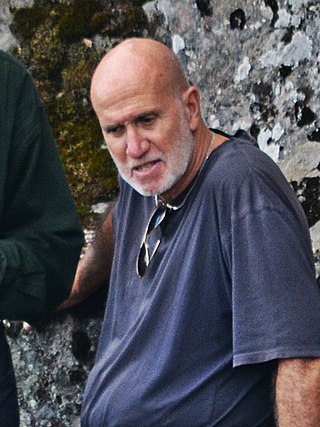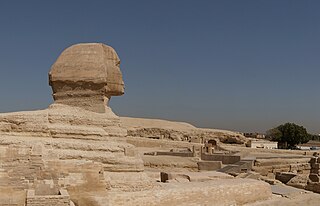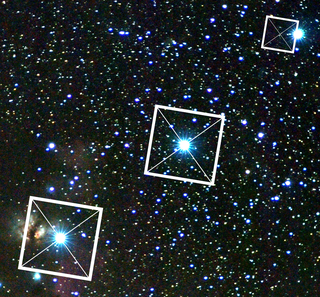
Atlantis is a fictional island mentioned in Plato's works Timaeus and Critias as part of an allegory on the hubris of nations. In the story, Atlantis is described as a naval empire that ruled all Western parts of the known world, making it the literary counter-image of the Achaemenid Empire. After an ill-fated attempt to conquer "Ancient Athens," Atlantis falls out of favor with the deities and submerges into the Atlantic Ocean. Since Plato describes Athens as resembling his ideal state in the Republic, the Atlantis story is meant to bear witness to the superiority of his concept of a state.
Charles Hutchins Hapgood was an American college professor and author who became one of the best known advocates of the pseudo-scientific claim of a rapid and recent pole shift with catastrophic results.
Pseudoarchaeology consists of attempts to study, interpret, or teach about the subject-matter of archaeology while rejecting, ignoring, or misunderstanding the accepted data-gathering and analytical methods of the discipline. These pseudoscientific interpretations involve the use of artifacts, sites or materials to construct scientifically insubstantial theories to strengthen the pseudoarchaeologists' claims. Methods include exaggeration of evidence, dramatic or romanticized conclusions, use of fallacious arguments, and fabrication of evidence.

Graham Bruce Hancock is a British writer who promotes pseudoscientific ideas about ancient civilizations and hypothetical lost lands. Hancock proposes that an advanced civilization with spiritual technology existed during the last Ice Age until it was destroyed following comet impacts around 12,900 years ago, at the onset of the Younger Dryas. He speculates that survivors of this cataclysm passed on their knowledge to primitive hunter-gatherers around the world, giving rise to all the earliest known civilizations.

Mu is a lost continent introduced by Augustus Le Plongeon (1825–1908), who identified the "Land of Mu" with Atlantis. The name was subsequently identified with the hypothetical land of Lemuria by James Churchward (1851–1936), who asserted that it was located in the Pacific Ocean before its destruction. The place of Mu in both pseudoscience and fantasy fiction is discussed in detail in Lost Continents by L. Sprague de Camp.

Atlantis: The Antediluvian World is a pseudoarchaeological book published in 1882 by Minnesota populist politician Ignatius L. Donnelly. Donnelly considered Plato's account of Atlantis as largely factual and suggested that all known ancient civilizations were descended from this lost land through a process of hyperdiffusionism.
The cataclysmic pole shift hypothesis is a pseudo-scientific claim that there have been recent, geologically rapid shifts in the axis of rotation of Earth, causing calamities such as floods and tectonic events or relatively rapid climate changes.

Robert Bauval is an Egyptian writer and lecturer, perhaps best known for the fringe Orion Correlation Theory regarding the Giza pyramid complex.

Mayanism is a non-codified eclectic collection of New Age beliefs, influenced in part by Pre-Columbian Maya mythology and some folk beliefs of the modern Maya peoples.

Fingerprints of the Gods: The Evidence of Earth's Lost Civilization is a 1995 pseudoarcheology book by British writer Graham Hancock. It contends that an advanced civilization existed on Antarctica during the last ice age, until the continent supposedly suddenly shifted south to its current position. The author proposes that survivors of this cataclysm passed on their profound knowledge to cultures around the world, giving rise to the earliest known civilizations. The idea is a form of hyperdiffusionism that is largely based on the work of Ignatius L. Donnelly and Charles Hapgood.

The Hall of Records is a purported ancient library that is claimed to exist underground near the Great Sphinx of Giza in Egypt. The concept originated with claims made by Edgar Cayce, an American who claimed to be clairvoyant and was a forerunner of the New Age movement. He said in the 1930s that refugees from Atlantis built the Hall of Records at Giza to preserve their knowledge. Cayce's assertions had many precursors, particularly the pseudohistorical theories about Atlantis that Ignatius Donnelly promulgated in the late 19th century, as well as claims about hidden passages at Giza that date back to medieval times.

There are several hypotheses about real-world events that could have inspired Plato's fictional story of Atlantis, told in the Timaeus and Critias. While Plato's story was not part of the Greek mythic tradition and his dialogues use it solely as an allegory about hubris, researchers have speculated about real natural disasters that could have served as inspiration. Additionally, many works of pseudohistory and pseudoarchaeology treat the story as fact, offering reinterpretations that tie to national mysticism or theories of ancient aliens. While Plato's story explicitly locates Atlantis in the Atlantic Ocean beyond the Pillars of Hercules, location hypotheses include Helike, Thera, Troy, and the North Pole.

The legendary island of Atlantis has often been depicted in literature, television shows, films and works of popular culture.
David Hatcher Childress is an American author, and the owner of Adventures Unlimited Press, a publishing house established in 1984 specializing in books on unusual topics such as ancient mysteries, unexplained phenomena, pseudohistory, and historical revisionism. His own works primarily concentrate on pseudoarchaeological and pseudoscientific topics such as "UFOs, secret societies, suppressed technology, cryptozoology [and] conspiracy theory." Childress, having no degree, refers to himself as a "rogue archaeologist".

From Atlantis to the Sphinx: Recovering the Lost Wisdom of the Ancient World is a 1996 book about the Great Sphinx of Giza by British author Colin Wilson. Wilson proposes that the Sphinx was constructed by a technologically advanced people "nearly 10,000 years before Egyptologists have hypothesized" by the same people who provided plans for the construction of the pyramids of Egypt, Central and South America.

The Orion correlation theory is a fringe theory in Egyptology attempting to explain the arrangement of the Giza pyramid complex.

Christian Arthur Edgar "Tim" O'Brien was a British exploration geologist and author. In 1936 he was also involved in the discovery of the Chogha Zanbil ziggurat in Southern Iran. Appointed by BP In 1967, he retired in 1971 as chairman of the boards and general managing director of the Iranian Oil Operating Companies, stationed in Tehran, and was appointed a CBE for services to the oil industry.
The geographical centre of Earth is the geometric centre of all land surfaces on Earth. Geometrically defined it is the centroid of all land surfaces within the two dimensions of the Geoid surface which approximates the Earth's outer shape. The term centre of minimum distance specifies the concept more precisely as the domain is the sphere surface without boundary and not the three-dimensional body.

Hyperdiffusionism is a pseudoarchaeological hypothesis that postulates that certain historical technologies or ideas were developed by a single people or civilization and then spread to other cultures. Thus, all great civilizations that engage in what appear to be similar cultural practices, such as the construction of pyramids, derived them from a single common progenitor. According to proponents of hyperdiffusion, examples of hyperdiffusion can be found in religious practices, cultural technologies, megalithic monuments, and lost ancient civilizations.
This is a bibliography of works by Colin Wilson.













